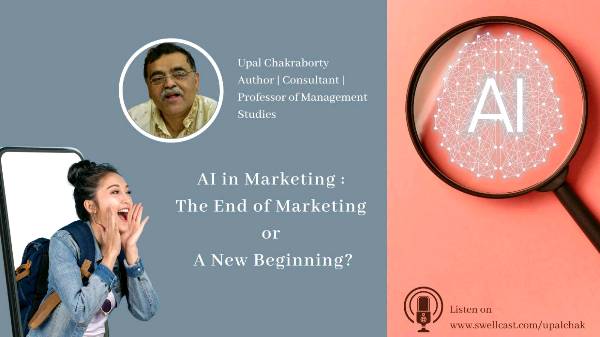You. Hello, I am Upal Chakraborty and I shall be podcasting a series of casts starting from today on the topic AI and marketing. Now, let me first introduce myself very briefly. I don't want to bore you with a long winded introduction. I have been worked in the corporate for about 40 years and in various companies like Pepsi, Wreckit, Ben, Keser, DLF and so on
upal chakraborty
@upalchak · 5:00
And therefore he canceled the order because he had to proceed to the next to deliver the next order, which I have nothing against that. So that is what I would like you to ponder about. Is that what we want out of artificial intelligence? That if there are ten scenarios. So how does the programmer work? He works out the scenarios. There is someone called a systems analyst or a business analyst in the It world. They analyze all the possible scenarios and accordingly the programming is done

Karan Dev
@Karan.Dev · 1:03
So over the course of several decades that your career spanned so many decades and you've got such an impressive track record in terms of work. I was wondering how your evolution of how your sort of curiosity on the subject evolved over time, and what do you think are the best ways to actually learn AI and marketing and how these fields kind of correlate? Are there maybe resources you could point to, other techniques or maybe practical things that one can do to really get a better understanding of this large area?

Sreeja V
@Wordsmith · 1:48
Again, there are pros and cons to this, which I will not get into, but as you rightly said, there are chat bots and there are limitations and it is going to definitely take a while, I think, to possibly integrate AI into all these aspects of life going forward. And also there is this huge elephant in the room, right, this discussion about how bringing in AI might be affecting jobs, right, in the long run, et cetera, et cetera
upal chakraborty
@upalchak · 4:30
And what we have got to and what I'm going to cover here is trying to understand how artificial intelligence can be compared with human intelligence. Can it ever reach this thing? No. The answer is no. Because we have 2 trillion neurons. 2 trillion neurons in a typical human brain. Now, that will take possibly another 10,000 years to reach that stage, so we'll never reach that. We'll never be able to replace human being
upal chakraborty
@upalchak · 4:53
Just order a few books on trying to find out how artificial intelligence can help in your mean don't make it domain in the take domain in the specific to the company you're working. Like if you're working for an FMCG, a fast moving consumer goods or electronic goods electronic goods company, it doesn't mean that you're going to orient only to that to him. Because tomorrow you may very well go to an industrial company which is manufacturing industrial products or an ecommerce company
upal chakraborty
@upalchak · 5:00
Artificial intelligence or AI is supposed to include that. The moment that happens, it is supposed to include that reason automatically. You don't have to contact a programmer or a coder to code it. I'll continue in the next cast
upal chakraborty
@upalchak · 4:52
He'll get a burn and it will feel much more than you or I feel because his skin is tender still. Now, it has been found out through experimental innumerable experiments that that child will refuse to touch a bottle after that unless he once again accidentally happens to touch it. And this time he gets a pleasant experience because that bottle is not so hot or it's cold. Now, his intelligence is limited because he's six months old. He will not understand that
upal chakraborty
@upalchak · 4:59
Continuation of the previous chatbot. And this is the last one for today. Next week we'll again continue. Okay, now this is called machine learning. Chat GPT is an example of machine learning. It's a regenerative thing, though it is limited only to editing. It's basically an editor. But it has got a vast reservoir of knowledge, a repertoire of knowledge at its back end. And it's based on that those are properly classified according to the key
